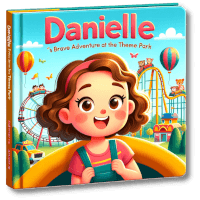Reading with children
a blog by Magic Tales

Unlocking Emotions & Adventures: The Magic Wand of Children's Literature
Children's literature has always held a special place in our hearts. Whether it's diving into the mystical worlds with Alice in Wonderland, smiling at the indomitable spirit of Anne of Green Gables, or reveling in the bravery of The Little Prince, books transport us into universes teeming with adventures that are both engaging and enlightening. But, these imagined worlds and memorable characters do more than just entertain - they nurture and sharpen emotional intelligence in young readers.
Adventures Hand-in-Hand with Emotional Intelligence
Adventures, whether faced by fictional children or animals, often come with their fair share of challenges. As young readers follow these characters in their quests, they learn to understand, manage, and express emotions - the very core of emotional intelligence.
Consider the trials Harry Potter faces: fear, rejection, sadness, but also friendship, joy, love. Reading about Harry's journey gives children metaphors to understand their own emotional universe. Similarly, characters like Matilda provide lessons in resilience, empathy, and emotional self-regulation, as they don’t let unfavorable circumstances deter their spirit.
Beyond Adventures - Understanding Oneself and Others
Ultimately, the emotional intelligence gleaned from these books is not just limited to individual interpersonal skills. It extends to fostering empathy, compassion, and understanding of others. In reading about diverse characters, children start to see the world through others' eyes.
The Elephant's protagonist 'Gerald' brings real and complex emotional situations to life on every page, helping children decode emotions like sadness, confusion, and joy. By understanding Gerald's feelings, children are learning to assess their own and others' emotions.
Enhancing Emotional Vocabulary
Good children's literature doesn't shy away from using a broad emotional vocabulary. Words like frustrated, excited, nervous, jealous, relieved, proud, etc., provide children with the language to better articulate their feelings. Encountering such words in their reading helps children learn, understand, and feel comfortable using them.
The Adventure Continues...
For both parents and children, children's literature offers a platform to explore emotions and develop emotional intelligence. So, whether it's an illustrated picture book or a chapter book, the magical journey through these pages continues to foster emotional growth.
The next time you pick a book for your child, remember you’re not just offering them a portal to a newfound adventure, you are also giving them a roadmap to navigate their emotional landscape. It's just another one of the many adventures literature brings to the table!
Want a personalized book to read with your child about Adventure?
Takes as quickly as 30 seconds to create
Create a book about Adventure

